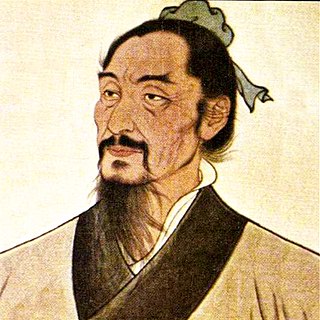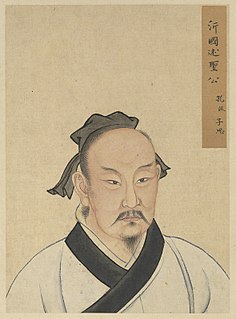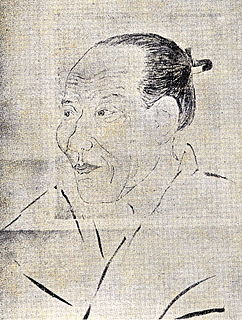Mengzi may refer to:
- Mencius (孟子), 372–289 BCE, Chinese philosopher
- Mencius (book), a collection of anecdotes and conversations of the philosopher Mencius
- Mengzi City (蒙自), Yunnan, China
Mengzi may refer to:

Mozi, original name Mo Di (墨翟), was a Chinese philosopher who founded the school of Mohism during the Hundred Schools of Thought period. The ancient text Mozi contains material ascribed to him and his followers.

Mencius ; born Mèng Kē ; or Mengzi was a Chinese Confucian philosopher who has often been described as the "second Sage", that is, after only Confucius himself. He is part of Confucius' fourth generation of disciples. Mencius inherited Confucius' ideology and developed it further. Living during the Warring States period, he is said to have spent much of his life travelling around the states offering counsel to different rulers. Conversations with these rulers form the basis of the Mencius, which would later be canonised as a Confucian classic.
Yang Zhu, also known as Yang Zi or Yangzi, was a Chinese philosopher during the Warring States period. An early ethical egoist alternative to Mohist and Confucian thought, Yang Zhu's surviving ideas appear primarily in the Chinese texts Huainanzi, Lüshi Chunqiu, Mengzi, and possibly the Liezi and Zhuangzi.

Lu Jiuyuan, or Lu Xiangshan, was a Chinese philosopher and writer who founded the school of the universal mind, the second most influential Neo-Confucian school. He was a contemporary and the main rival of Zhu Xi.

Zisi, born Kong Ji (孔伋), was a Chinese philosopher and the grandson of Confucius.
Gaozi, or Gao Buhai (告不害), was a Chinese philosopher during the Warring States period. Gaozi's teachings are no longer extant, but he was a contemporary of Mencius, and most of our knowledge about him comes from the Mencius book (6) titled "Gaozi".

Mengzi is a city in the southeast of Yunnan Province, China. Administratively, it is a county-level city and the seat of the Honghe Hani and Yi Autonomous Prefecture, located about 175 kilometres (109 mi) south-southeast of the provincial capital of Kunming. It is situated in the centre of a fertile valley basin on a plateau 1,310 metres (4,300 ft) above sea level and was home to 417,156 inhabitants as of 2010 census. Mengzi was formerly Mengzi County (蒙自县) until October 2010, when it was upgraded to a county-level city.
Philip J. Ivanhoe is an historian of Chinese thought, particularly of Confucianism and Neo-Confucianism. He is a professor and chair of the Department of East Asian Languages and Cultures at Georgetown University. Ivanhoe is perhaps best known for two claims: that Neo-Confucian philosophers such as Zhu Xi and Wang Yangming have systematically misinterpreted earlier Confucians such as Confucius himself, and Mengzi; and that Confucianism may usefully be understood as a version of virtue ethics.

Itō Jinsai, who also went by the pen name Keisai, was a Japanese Confucian philosopher and educator. He is considered to be one of the most influential Confucian scholars of seventeenth century Japan, and the Tokugawa period (1600–1868) generally, his teachings flourishing especially in Kyoto and the Kansai area through the final years of the Tokugawa shogunate.

Meng is a Chinese surname. Meng is a shi surname or clan name (氏), as opposed to the xing (姓) category of surname, ancestral name. Meng is of the type of surname which was a member of the list of names denoting seniority within a certain family: in ancient usage, the characters of meng (孟), zhong (仲), shu (叔) and ji (季) were used to denote the first, second, third and fourth eldest sons in a family. These were sometimes adopted as surnames. Of these, Meng is the best known, being the surname of the philosopher Mencius. It is the 94th name on the Hundred Family Surnames poem.

Zoucheng is a county-level city in the south of Shandong province, China. Before it became a city, it was known as Zou County or Zouxian.
The Thirteen Classics is a term for the group of thirteen classics of Confucian tradition that became the basis for the Imperial Examinations during the Song dynasty and have shaped much of East Asian culture and thought. It includes all of the Four Books and Five Classics but organizes them differently and includes the Classic of Filial Piety and Erya.

The Mencius is a collection of conversations, anecdotes, and series of genuine and imagined interviews by the Confucian philosopher, Mencius. The book is one of the Chinese Thirteen Classics, and explores Mencius’ views on the topics of moral and political philosophy, often as a dialogue with the ideas presented by Confucianism. The interviews and conversations are depicted as being either between Mencius and the various rulers of the Warring States period, or with his students and other contemporaries. The book documents Mencius’ travel across the states, and his philosophical conversations and debates with those he meets on his journey. A number of scholars suggest that the text was not written by Mencius himself, but rather by his disciples. The text is believed to have been written during the late 4th century BC.
Agriculturalism, also known as the School of Agrarianism, the School of Agronomists, the School of Tillers, and in Chinese as the Nongjia, was an early agrarian Chinese philosophy that advocated peasant utopian communalism and egalitarianism.
Yangism was a philosophical school founded by Yang Zhu, extant during the Warring States period, that believed that human actions are and should be based on self-interest. The school has been described by sinologists as an early form of psychological and ethical egoism. The main focus of the Yangists was on the concept of xing (性), or human nature, a term later incorporated by Mencius into Confucianism. No documents directly authored by the Yangists have been discovered yet, and all that is known of the school comes from the comments of rival philosophers, specifically in the Chinese texts Huainanzi, Lüshi Chunqiu, Mengzi, and possibly the Liezi and Zhuangzi. The philosopher Mencius claimed that Yangism once rivaled Confucianism and Mohism, although the veracity of this claim remains controversial among sinologists. Because Yangism had largely faded into obscurity by the time that Sima Qian compiled his Shiji, the school was not included as one of the Hundred Schools of Thought.
In Chinese philosophy, xin can refer to one's "disposition" or "feelings", or to one's confidence or trust in something or someone. Literally, xin (心) refers to the physical heart, though it is sometimes translated as "mind" as the ancient Chinese believed the heart was the center of human cognition. For this reason, it is also sometimes translated as "heart-mind". It has a connotation of intention, yet can be used to refer to long-term goals. Xunzi, an important early Confucian thinker, considered xin (心) to be cultivated during one's life, in contrast to innate qualities of xing, or human nature.
The Four Sages, Assessors, or Correlates are four eminent Chinese philosophers in the Confucian tradition. They are traditionally accorded a kind of sainthood and their spirit tablets are prominently placed in Confucian temples, two upon the east and two upon the west side of the Hall of the Great Completion.

Lǔ is the pinyin romanization of the Chinese surname written 鲁 in simplified character and 魯 in traditional character. It is also spelled Lo according to the Cantonese pronunciation. Lu 鲁 is listed 49th in the Song Dynasty classic text Hundred Family Surnames. As of 2008, Lu 鲁 is the 115th most common surname in China.

The Kunming–Yuxi–Hekou railway is a standard-gauge railway in Yunnan Province of China, linking the provincial capital Kunming with the town of Hekou on the Vietnamese border. Constructed in several stages between 1989 and 2014, the Kunming–Yuxi–Hekou railway has largely replaced the Chinese section of the old metre-gauge Kunming–Haiphong railway for normal passenger and cargo transportation. The line is electrified, but single-tracked over most of its length.
Consanguinism is an element of Confucianism referenced in modern discussions of Chinese philosophy to describe the emphasis on kinship bonds and filial piety in Confucian ethics. The phrase “consanguineous affection” was popularized by scholar Liu Qingping in a series of essays written throughout the 2000s, and it has since become a major focus of current debates over the correlation between Confucian ethics and trends of corruption in modern Chinese society. While the term “consanguinity” simply refers to the blood relations shared between family members and their ancestors, many interpret it within the context of Confucianism to imply that these bonds serve as the supreme value on which all moral decisions should be based.